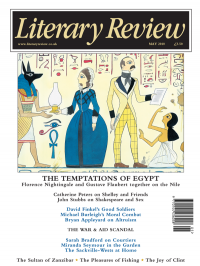Roderick Matthews
Broken India
Jinnah: India – Partition – Independence
By Jaswant Singh
Oxford University Press 565pp £17.50
Mohammad Ali Jinnah (1876–1948), the founder of Pakistan, has long been a favourite villain of the Indian Right, reviled as the prime architect of the Partition of India in 1947. Jinnah: India – Partition – Independence dares to question this orthodoxy, and its publication in August 2009 caused a political sensation in India. Its author, former Minister for External Affairs Jaswant Singh, was summarily expelled from the Hindu nationalist BJP for blasphemies against the party’s ‘core beliefs’, and for claiming that Jinnah had been ‘demonised’ by the Indian media.
Singh does indeed write admiringly of Jinnah in personal terms, describing his virtues as ‘intense’ and his faults as ‘trivial’ – a radical departure from the received wisdom that he was aloof, arrogant, inflexible and manically ambitious. Singh is kinder, perhaps, because as a politician himself he can

Sign Up to our newsletter
Receive free articles, highlights from the archive, news, details of prizes, and much more.@Lit_Review
Follow Literary Review on Twitter
Twitter Feed
Johannes Gutenberg cut corners at every turn when putting together his bible. How, then, did his creation achieve such renown?
@JosephHone_ investigates.
Joseph Hone - Start the Presses!
Joseph Hone: Start the Presses! - Johannes Gutenberg: A Biography in Books by Eric Marshall White
literaryreview.co.uk
Convinced of her own brilliance, Gertrude Stein wished to be ‘as popular as Gilbert and Sullivan’ and laboured tirelessly to ensure that her celebrity would outlive her.
@sophieolive examines the real Stein.
Sophie Oliver - The Once & Future Genius
Sophie Oliver: The Once & Future Genius - Gertrude Stein: An Afterlife by Francesca Wade
literaryreview.co.uk
Princess Diana was adored and scorned, idolised, canonised and chastised.
Why, asks @NshShulman, was everyone mad about Diana?
Find out in the May issue of Literary Review, out now.
Literary Review - For People Who Devour Books
In the Current Issue: Nicola Shulman on Princess Diana * Sophie Oliver on Gertrude Stein * Costica Bradatan on P...
literaryreview.co.uk